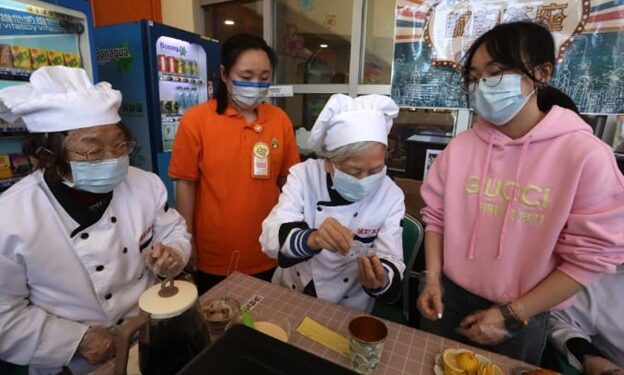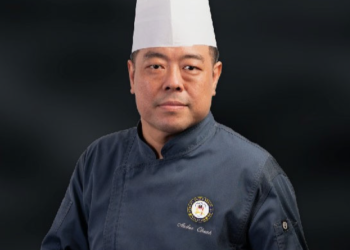In 2017, over 100,000 Hong Kong citizens aged 60 and above were affected by dementia. Dementia impairs one’s speech, affecting vocabulary, response and talking speed, but the activity encourages them to speak more because they need to work with each other at the booths. Officials estimate that number could exceed 300,000 in 2039, as the city’s population shrinks rapidly.
According to a study conducted by Hong Kong University of China in 2021, the obesity rate is high. 5 percent of dementia in people 60 and older and up to 47.5 percent in people over 85.
Shing Kee, a three-table cafe, is currently open only to nursing homes. As the nursing home staff slowly escorted the residents to the porch, eight cafe “staff” rolled up their sleeves to welcome the first group of customers.
While two residents took orders, the remaining residents worked tirelessly to prepare toast and sandwiches, reheat pineapple rolls and curry fish balls, and serve drinks from two kiosks with the help of student volunteers and nursing home staff. When the food was ready, patrons paid the boss. “—another resident—at a small counter with play coins.
Yancy Chu Mung-yan, an occupational therapist in charge of the program, said she was inspired by Japanese memorial cafes run by elderly dementia patients and began preparations in December.
“Many elderly residents showed signs of social withdrawal after the pandemic because they were too scared of getting infected, so it took some time for us to encourage them to join this activity. Compared with our regular cognitive training, this is more engaging for both patrons and staff because it is a group activity, allowing them to interact and communicate with each other,” Chu said.
Resident Leung Kam-chiu, 79, spent the afternoon taking orders shares that “This is easy for me, I could take some harder challenges next time.” One of the oldest employees of this cafe was Wong Shui-ying, who is 93 years old and responsible for making the toast.
Dai pai dong, the former owner of the street food stall, also helped design the menus and workflows in the stalls. “She was getting in bad moods after being discharged from hospital earlier, and needed to use a walking frame, but now she is very happy to make food again, despite being very slow. She would even show us how to cut the butter and make tuna paste nicely” said her 72-year-old daughter Mandy Lau.







